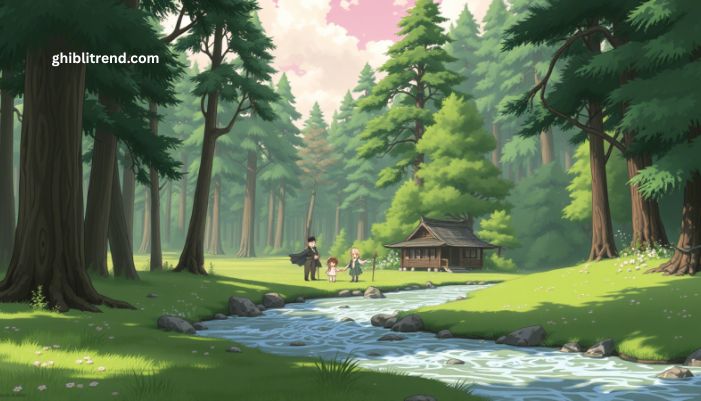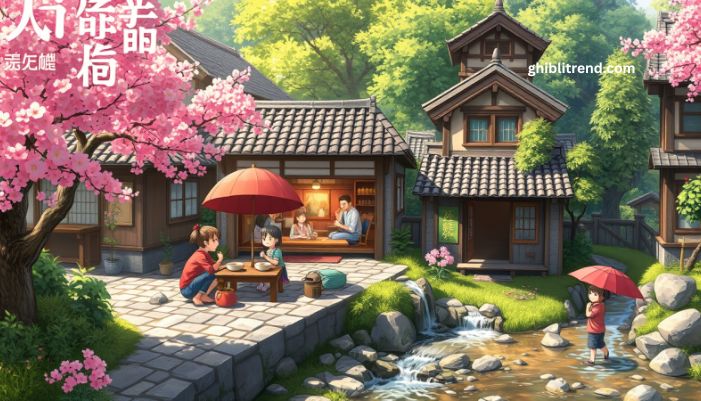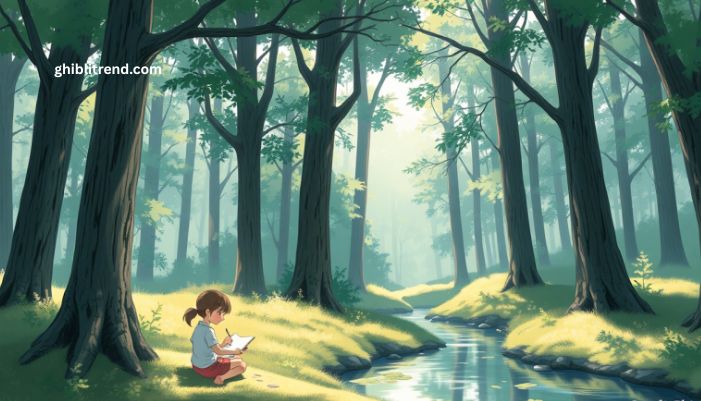Artwork Ghibli: Inside the Magical Worlds of Studio Ghibli
Have you ever watched a Studio Ghibli film and felt like you were inside a painting? That’s the power of artwork Ghibli. These animated films do more than tell stories—they show them in the most magical way. Every frame feels alive.
This article will walk you through what makes Ghibli’s art so special. We’ll explore how the pictures are made, what they mean, and why people around the world love them. Whether you’re a longtime fan or just getting started, you’ll see why Ghibli’s artwork stays in our hearts.
What Makes Ghibli’s Art So Special?
Everything Is Drawn by Hand
Most Ghibli movies are made by drawing each scene by hand. This takes a lot of time and effort, but the results are worth it. Hand-drawn art gives each frame a soft, warm feeling. It’s not perfect, but that’s what makes it real.
You can feel the wind in the trees, see the light bounce off water, and almost smell the food cooking. These little touches make the world feel real—even when it’s full of magic.
Art That Tells a Story
In Ghibli films, the drawings aren’t just for looks—they help tell the story. You can often understand what’s happening just by watching the characters’ faces or seeing how they move.
If a girl looks down and her hands are shaking, you know she’s scared. If a town is dark and rainy, you know something sad or serious is happening. The pictures speak without words.
Ghibli’s Art Is Inspired by the Real World

Nature Is Everywhere
Ghibli movies often show forests, rivers, fields, and skies. These places feel calm and peaceful. That’s because the artists study real places in Japan before drawing them.
Even in fantasy stories, Ghibli keeps the world close to nature. The trees look like real trees. The animals act like real animals. You feel like you’ve been there before—even if it’s your first time watching.
Simple Life, Deep Meaning
You’ll often see small towns, quiet rooms, or old houses in Ghibli films. These places look ordinary, but they’re full of feeling. The way a curtain moves in the wind or a train rushes by tells us something about the mood.
This focus on daily life makes the movies feel honest and true, even when the stories are full of magic.
Signature Styles in Ghibli Artwork

Stunning Backgrounds
Backgrounds in Ghibli films are full of detail. A single scene can show a busy street, a peaceful garden, or a kitchen full of tools and dishes. These places feel like they really exist.
The colors are soft and clean. They match the mood of the story. A happy scene might have bright skies and flowers. A scary one might be full of shadows and mist.
Food That Makes You Hungry
One of the most loved parts of Ghibli art is the food. Have you seen the noodle soup in Ponyo or the big feast in Spirited Away? The food looks so real you want to eat it!
It’s not just about looks—it’s the way it moves and steams, the sound of it being made, and the joy in the characters’ faces when they eat. These scenes show the simple joy of everyday life.
Buildings With Personality
Houses, shops, and castles in Ghibli films have their own charm. They aren’t perfect. Sometimes they look a little messy or old. But that makes them feel alive.
The bathhouse in Spirited Away, for example, is huge and full of mystery. The moving castle in Howl’s Moving Castle looks like it has a mind of its own. These places stay in your memory long after the movie ends.
Read: GhibliTrend: Nature, Nostalgia, and Soft Style in 2025
The Artists Behind the Scenes
Hayao Miyazaki’s Vision
Hayao Miyazaki is the co-founder of Studio Ghibli. He loves to draw and is very careful about every little detail. He often helps with the drawings himself and checks every scene.
He believes in showing real emotions and real places—even in fantasy. He also cares deeply about nature, family, and kindness. These ideas show up in the art over and over again.
A Team That Cares
It’s not just Miyazaki—Ghibli has many artists who work hard to make each movie beautiful. They paint the skies, design the rooms, and bring the characters to life.
They take their time. A single movie can take years to finish. But the result is a work of art that lasts forever.
How Ghibli Art Affects Fans and Creators

A Door to the Imagination
Many people fall in love with Ghibli’s art from the first scene they see. It inspires dreams. It makes people want to draw, paint, or even become animators themselves.
Kids and adults around the world try to copy Ghibli’s style in their own art. It shows how much the artwork means to them.
A Big Community of Fans
All over the internet, fans share Ghibli-inspired drawings, stories, and videos. Some make food from the movies. Others build models of the houses and towns.
This fan love keeps growing. Ghibli’s artwork is more than just something to watch—it’s something to be part of.
Symbols and Meaning in Ghibli Artwork
Colors That Say Something
Ghibli uses color in a smart way. Bright colors often show joy, safety, or fun. Dark colors may mean something sad or scary is coming.
Look closely, and you’ll see that the color changes with the story. It helps you feel what the characters feel.
Every Detail Matters
Nothing is random in a Ghibli scene. A shoe on the floor, a tree outside the window, or a cup of tea on the table—all these things add to the story.
These small details make the world feel full. Even when nothing big is happening, you feel like you’re learning something about the characters or the place they live.
Why Ghibli’s Art Still Matters Today
It Slows Us Down
In a world where everything moves fast, Ghibli invites us to slow down. The art lets us breathe. It gives us space to think, feel, and notice the beauty around us.
You don’t just watch a Ghibli movie. You experience it. And that’s why people keep coming back.
It Speaks to Everyone
Ghibli’s artwork isn’t just for kids or adults. It’s for everyone. It doesn’t matter where you’re from or what language you speak. The pictures tell stories we all understand.
That’s what makes artwork Ghibli so powerful—it connects people through feeling, beauty, and wonder.
Conclusion
Artwork Ghibli is not just animation. It’s heart, emotion, and beauty—all rolled into one. It mixes fantasy with real life, sadness with joy, and stillness with motion. Every scene shows us how to feel more, see more, and dream more.
It’s the kind of art that stays with you. Years later, you might remember the way the wind moved the grass in Totoro, or how the stars shone in Howl’s Moving Castle. These images become part of your story, too.